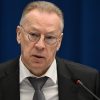
A knife-wielding man killed three people at the Notre-Dame Basilica in the French city of Nice on Thursday
Credit: AFP
The Turkish president’s bellicose rhetoric towards France over the publication of caricatures of the Prophet Mohammed may have contributed to a climate of anger that led to the deadly terror attack in the city of Nice on Thursday, terrorism experts and EU politicians have said.
A woman was decapitated, and two more people killed, in an attack in a church in Nice on Thursday that the city’s mayor described as terrorism after the alleged perpetrator reportedly chanted “Alllahu akbar” as he was arrested.
Terrorism experts believe the attack – alongside a stabbing at the French consulate in Jeddah, Saudi Arabia, and an incident in Avignon where police killed a man brandishing a gun – were retaliation by extremists for France’s hardening attitudes towards Muslims.
French President Emmanuel Macron ordered a crackdown on Islamists this month, following the beheading of a teacher who showed his class caricatures of the Prophet Mohammed, something many Muslims consider blasphemous and offensive.
Turkish President Recep Tayipp Erdogan has led criticism in the Muslim world of Mr Macron, repeatedly saying he needed mental evaluation over his stance towards Islam.
"What is Macron’s problem with Islam? What is his problem with Muslims?" Mr Erdogan asked over the weekend.
“Erdogan has been positioning himself and Turkey as the champion of the downtrodden Ummah,” or global Muslim community, said Nicholas Heras of the Institute for the Study of War.
Anger at the cartoons was being “accentuated by some of the hypocritical calls by various Muslim leaders,” including Mr Erdogan, said Raffaello Pantucci, a senior associate fellow at the Royal United Services Institute.
Belgian liberal MEP Hilde Vautmans, who is shadow rapporteur for Turkey on the European Parliament’s foreign affairs committee, said: "President Erdoğan’s rhetoric towards Emmanuel Macron this week was deeply inappropriate. Words have consequences.
"We urge him to refrain from his provocations, which are endangering relations between EU countries and Ankara."
In Brussels, the presidents of the European Council and Commission offered their support to President Macron. They backed his defence of freedom of expression in the face of Islamist fundamentalism.
"Freedom of expression is a fundamental value underpinning our democracy," said Charles Michel, the president of the European Council.
On Wednesday, the day before the attacks, pro-Islamic State social media channels began sharing a propaganda video exhorting followers to defend the Prophet by “striking the necks”, in reference to the beheading of teacher Samuel Paty in a Paris suburb on October 16.
The video was produced “to capitalise on the teacher’s beheading and encourage similar attacks,” said Laith AlKhouri, a private sector counter-terrorism adviser.
“The attacks are part of a long, ongoing confrontation between France and the jihadists,” Mr AlKhouri said. “Jihadists see France as an enemy against Muslims in and out of the country – whether for banning the niqab or as part of the global coalition [against IS].”
Jihadist social media users celebrated Thursday’s attacks, in one instance sharing an image of a beheading with captions in English and Arabic reading “Slit their throats”.
“French pigs said publishing caricatures to mock the prophet was French way of humor and jest,” one user wrote. “Now I wonder how many French will find those caricatures funny knowing that they got 3 beheaded French Kuffar [unbelievers] as the cost.”
There was no immediate claim of responsibility for the attacks, which may have been committed by “lone wolf” attackers inspired by radical Islamist preaching, not all of which is necessarily linked to Islamic State, said Mr Heras.
Turkey condemned the attack, with its foreign ministry expressing “solidarity with French people as a nation who also lost her citizens to terrorism”.
But Ankara’s condolences may not placate those who have already called for sanctioning Turkey over Mr Erdogan’s calls for Turks to boycott French products.
“Enough is enough. We need action, no more words against #Erdogan and his countless provocations,” Manfred Weber, the leader of the largest bloc in the European Parliament, said on Twitter.






















































Свежие комментарии